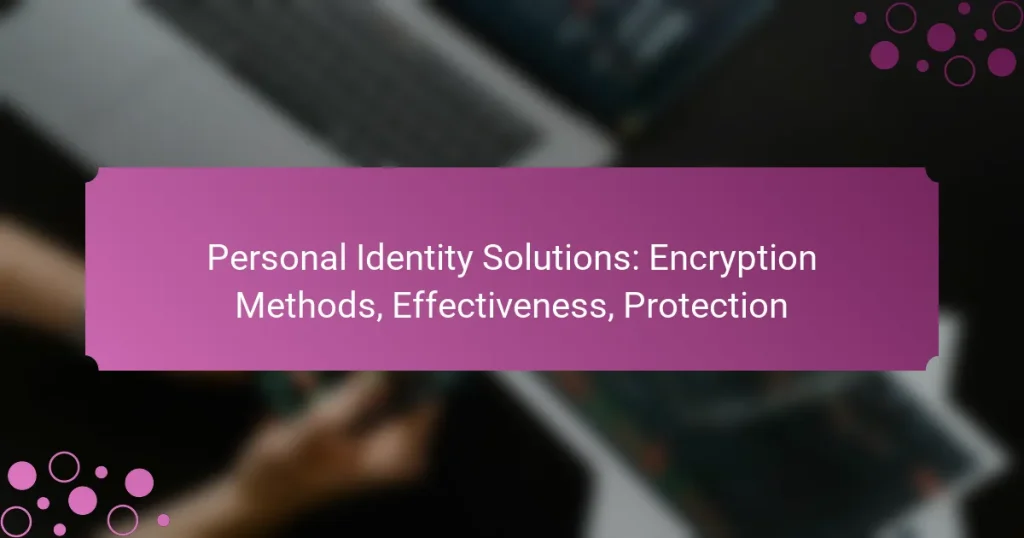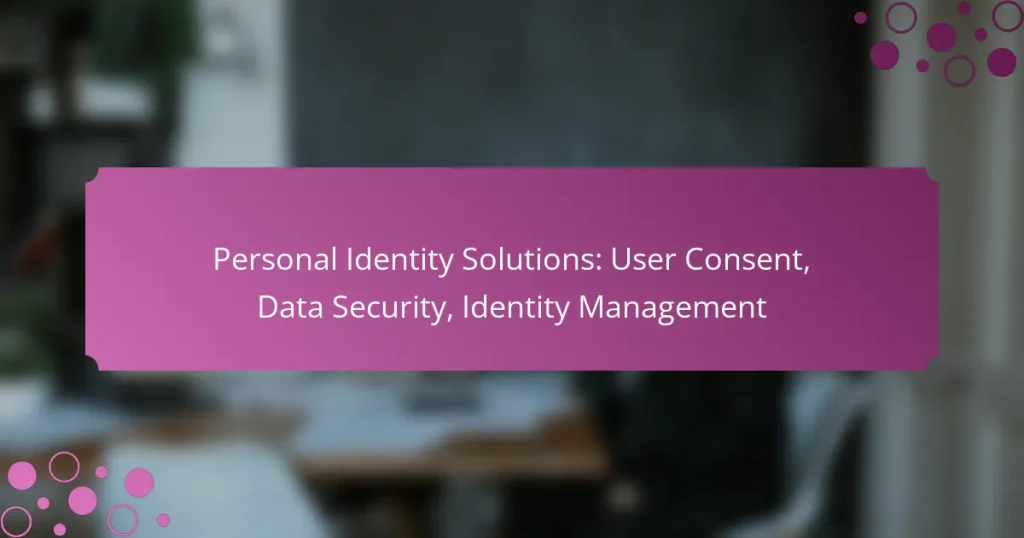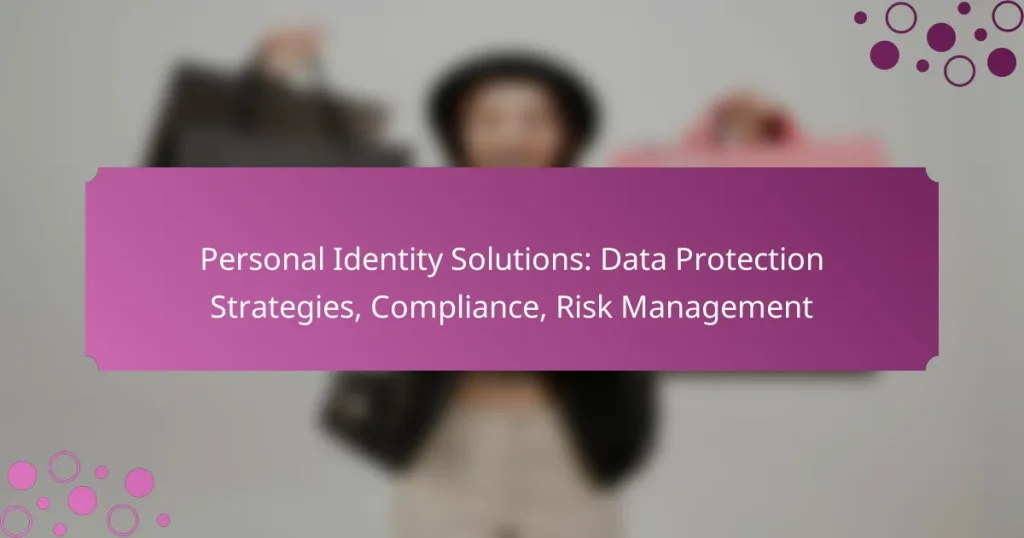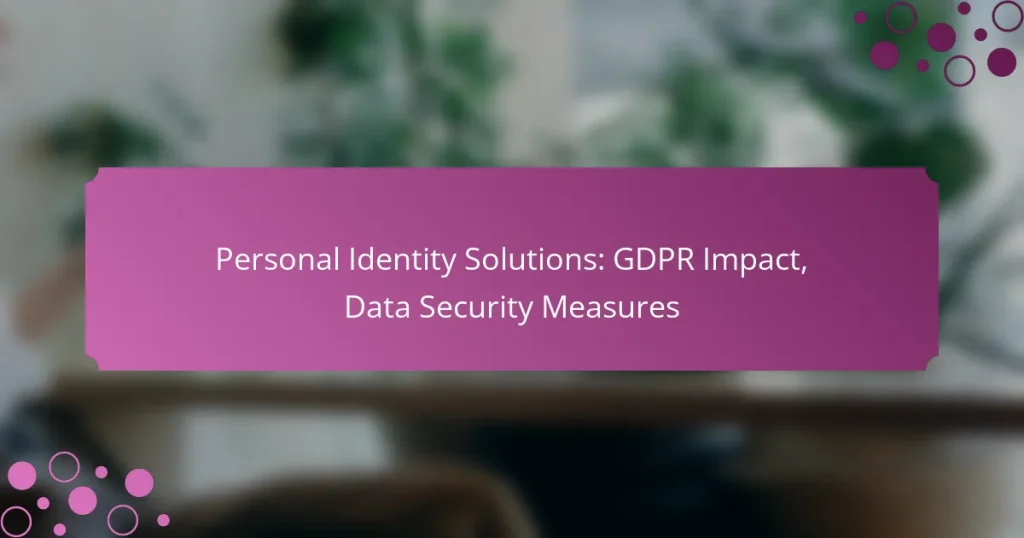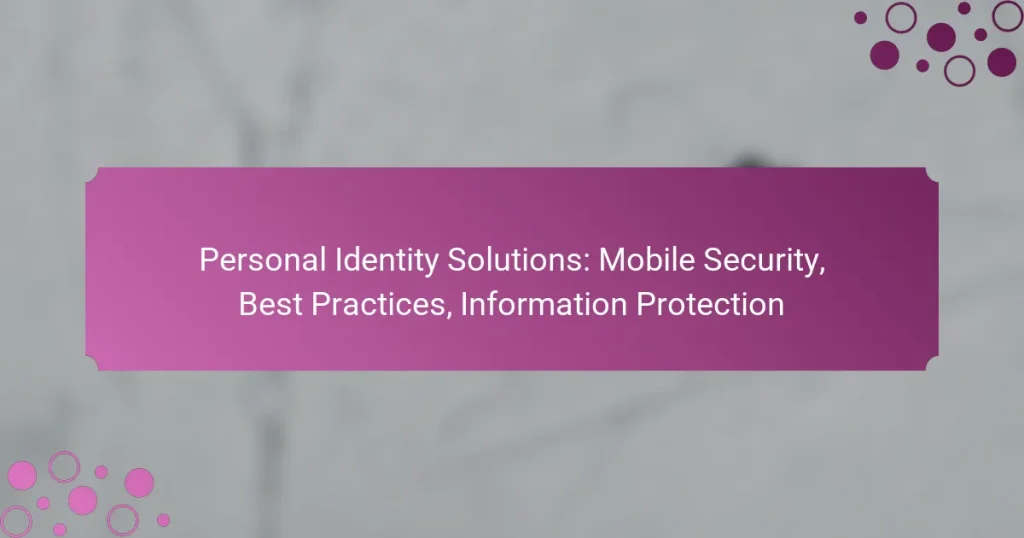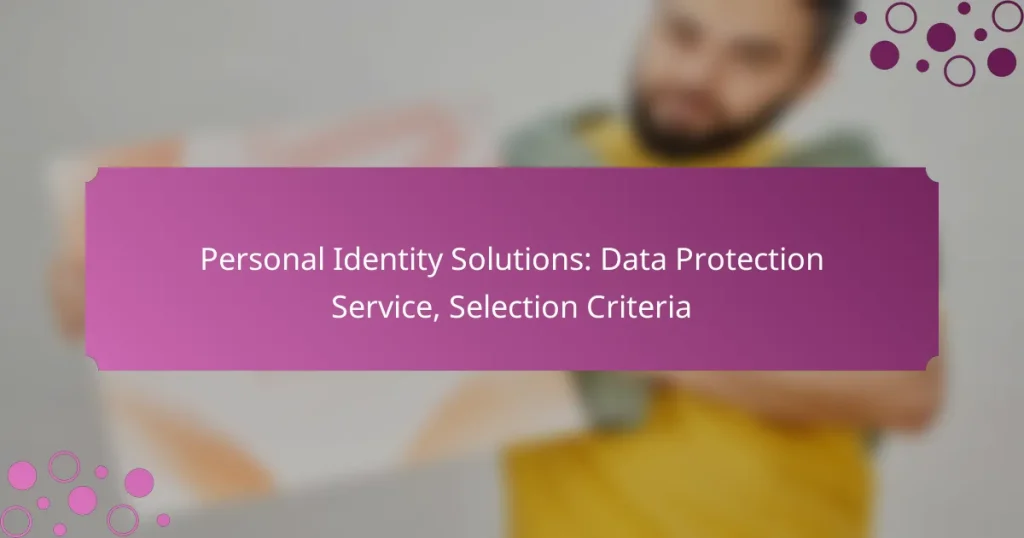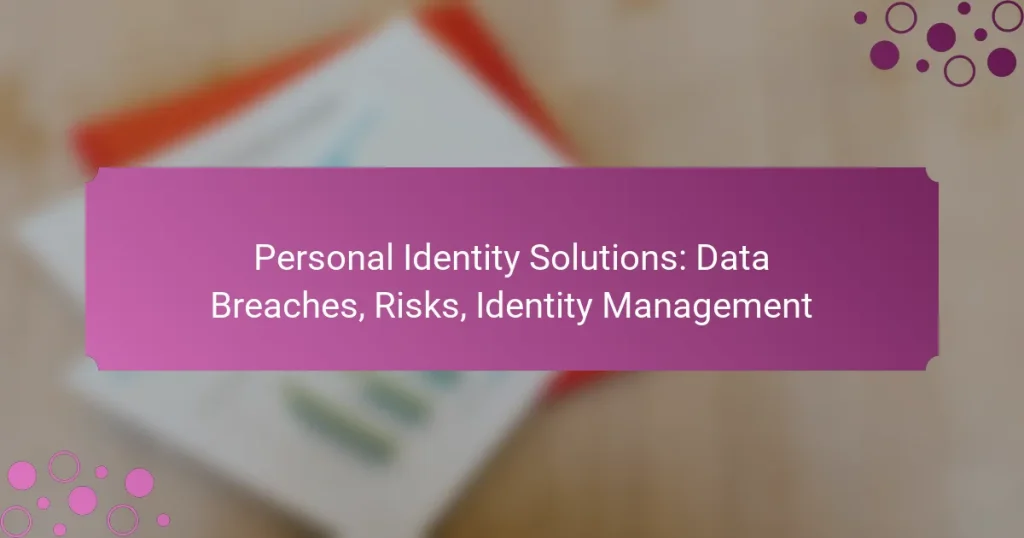Personal identity solutions are essential for safeguarding privacy and securing data in today’s digital landscape. These tools, ranging from identity theft protection services to secure password managers, empower individuals to manage their personal information effectively while minimizing exposure to risks. By adopting these solutions, users can enhance their online security and maintain greater control over their data.
Personal Identity Solutions: User Consent, Data Security, Identity Management
Personal Identity Solutions: Data Protection Strategies, Compliance, Risk Management
Personal Identity Solutions: GDPR Impact, Data Security Measures
Personal Identity Solutions: Mobile Security, Best Practices, Information Protection
Personal Identity Solutions: Data Protection Service, Selection Criteria
Personal Identity Solutions: Data Breaches, Risks, Identity Management
What are the best personal identity solutions in the UK?
The best personal identity solutions in the UK focus on protecting your privacy and securing your data. These solutions include identity theft protection services, data encryption tools, privacy-focused VPNs, secure password managers, and two-factor authentication apps.
Identity theft protection services
Identity theft protection services monitor your personal information and alert you to potential misuse. They often include features like credit monitoring, identity restoration assistance, and insurance against financial losses due to identity theft.
When selecting a service, consider the level of monitoring offered and whether it includes support for recovering stolen identities. Popular options in the UK include Experian Identity Theft Protection and Equifax Identity Watch.
Data encryption tools
Data encryption tools secure your sensitive information by converting it into unreadable code, which can only be accessed with a decryption key. This is crucial for protecting files on your devices and during online transactions.
Look for tools that comply with strong encryption standards, such as AES-256. Examples include VeraCrypt for file encryption and NordLocker for secure cloud storage.
Privacy-focused VPNs
Privacy-focused VPNs (Virtual Private Networks) encrypt your internet connection, shielding your online activities from prying eyes. They are essential for maintaining privacy while browsing, especially on public Wi-Fi networks.
Choose a VPN that does not log your activity and offers strong encryption protocols. Popular options in the UK include ExpressVPN and CyberGhost, both known for their user-friendly interfaces and robust security features.
Secure password managers
Secure password managers store and encrypt your passwords, making it easier to manage multiple accounts without compromising security. They can generate strong passwords and autofill them on websites.
When selecting a password manager, ensure it offers end-to-end encryption and two-factor authentication. Notable choices include LastPass and 1Password, which are widely used for their reliability and features.
Two-factor authentication apps
Two-factor authentication (2FA) apps add an extra layer of security by requiring a second form of verification in addition to your password. This significantly reduces the risk of unauthorized access to your accounts.
Popular 2FA apps include Google Authenticator and Authy, both of which generate time-sensitive codes for logging in. Always enable 2FA on accounts that support it to enhance your security posture.
How do personal identity solutions enhance privacy?
Personal identity solutions enhance privacy by providing users with tools to manage their personal data securely and efficiently. These solutions help minimize data exposure, give individuals control over their information, and ensure secure online transactions.
Minimize data exposure
Minimizing data exposure is crucial for protecting personal information from unauthorized access. Personal identity solutions often employ techniques such as data masking, encryption, and anonymization to limit the amount of personal data shared with third parties.
For example, using a virtual private network (VPN) can help shield your IP address while browsing, reducing the risk of tracking. Additionally, opting for services that require minimal personal information can further decrease your data footprint.
Control over personal information
Having control over personal information means users can decide what data to share and with whom. Personal identity solutions typically offer dashboards or interfaces that allow individuals to manage their data preferences easily.
For instance, many platforms allow users to adjust privacy settings, enabling them to restrict access to sensitive information. Regularly reviewing these settings is essential to maintain control and ensure that only necessary data is shared.
Secure online transactions
Secure online transactions are vital for protecting financial information during digital exchanges. Personal identity solutions often incorporate advanced security measures like two-factor authentication (2FA) and secure payment gateways to safeguard transactions.
When making online purchases, using services that offer buyer protection can add an extra layer of security. Additionally, keeping software updated and using strong, unique passwords can help prevent unauthorized access to financial accounts.
What are the costs of personal identity solutions?
The costs of personal identity solutions can vary significantly based on the type of service, features offered, and payment structure. Users should consider both ongoing subscription fees and one-time purchase costs when evaluating their options.
Monthly subscription fees
Monthly subscription fees for personal identity solutions typically range from $10 to $30, depending on the level of service and features included. These fees often cover identity monitoring, fraud alerts, and insurance against identity theft.
When selecting a subscription, consider the specific services provided, such as credit score tracking or dark web monitoring, as these can impact the overall value of the plan. Some providers may offer discounts for annual payments, which can be a cost-effective option.
One-time purchase costs
One-time purchase costs for personal identity solutions can vary widely, often falling between $50 and $200. These costs usually cover comprehensive identity protection services, such as a detailed credit report or identity theft recovery services.
It’s essential to evaluate what is included in a one-time purchase. Some services may offer a single report, while others provide ongoing monitoring for a limited time. Be sure to read the fine print to understand the duration of the coverage.
Free vs. premium service comparisons
Free personal identity solutions often provide basic monitoring and alerts, but may lack comprehensive features such as insurance or recovery assistance. Premium services, on the other hand, typically offer extensive monitoring, identity theft insurance, and dedicated support.
When comparing free and premium options, assess your personal needs. If you require robust protection and support, investing in a premium service may be worthwhile. However, for those with minimal risk or budget constraints, a free service might suffice for basic monitoring.
What criteria should I consider when choosing a solution?
When selecting a personal identity solution, focus on the provider’s reputation, the features they offer, and the availability of customer support. These factors significantly impact the effectiveness and reliability of the solution in safeguarding your privacy and data security.
Reputation of the provider
The reputation of the provider is crucial in determining the trustworthiness of a personal identity solution. Look for companies with a proven track record in data security and positive customer reviews. Research their history, any past data breaches, and their compliance with industry standards.
Consider checking third-party reviews and ratings on platforms like Trustpilot or Google Reviews. A well-regarded provider often indicates a commitment to maintaining high security and privacy standards.
Features offered
Evaluate the features provided by the identity solution to ensure they meet your specific needs. Essential features may include identity theft protection, credit monitoring, and secure document storage. Some solutions also offer advanced features like biometric authentication or dark web monitoring.
Compare the features across different providers to identify which ones offer the best value for your requirements. A solution that includes comprehensive features may justify a higher price point if it enhances your overall security.
Customer support availability
Customer support is vital for addressing any issues that may arise with your identity solution. Check if the provider offers multiple support channels such as phone, email, and live chat, and ensure they have a responsive support team.
Look for providers that offer 24/7 support or at least extended hours, as this can be crucial in emergencies. Read customer feedback regarding their support experiences to gauge the reliability and effectiveness of the assistance offered.
What are the legal implications of data security in the UK?
The legal implications of data security in the UK are primarily governed by the UK General Data Protection Regulation (UK GDPR) and the Data Protection Act 2018. Organizations must ensure they handle personal data responsibly to avoid significant penalties and maintain consumer trust.
GDPR compliance requirements
GDPR compliance requires organizations to implement measures that protect personal data and ensure individuals’ rights are respected. Key requirements include obtaining explicit consent for data processing, ensuring data accuracy, and providing individuals with access to their data.
Organizations must also appoint a Data Protection Officer (DPO) if they process large amounts of sensitive data. Regular audits and risk assessments are essential to identify vulnerabilities and ensure ongoing compliance with GDPR standards.
Data breach notification laws
Under UK law, organizations must notify the Information Commissioner’s Office (ICO) of a data breach within 72 hours if it poses a risk to individuals’ rights and freedoms. Failure to report a breach can result in hefty fines and reputational damage.
Additionally, affected individuals must be informed if the breach is likely to result in high risks to their rights. Organizations should have a clear incident response plan in place to manage breaches effectively and minimize potential harm.
How can businesses implement personal identity solutions?
Businesses can implement personal identity solutions by integrating advanced technologies and processes that enhance privacy and data security. This involves adopting identity verification tools, ensuring compliance with regulations, and fostering a culture of data protection.
Utilizing Identity Verification Technologies
Identity verification technologies such as biometrics, two-factor authentication, and digital identity platforms are essential for safeguarding personal information. These tools help confirm user identities and reduce the risk of fraud. For instance, biometric systems can include fingerprint or facial recognition, which are increasingly popular in sectors like banking and healthcare.
When selecting identity verification technologies, consider the user experience and the level of security required. A balance between convenience and protection is crucial. For example, while biometric methods offer high security, they may require additional user training or adaptation.
Ensuring Compliance with Regulations
Compliance with regulations such as GDPR in Europe or CCPA in California is vital for businesses handling personal data. These laws mandate strict guidelines on data collection, storage, and sharing practices. Non-compliance can lead to significant fines and damage to reputation.
To ensure compliance, businesses should conduct regular audits of their data handling practices and implement necessary changes. Keeping abreast of evolving regulations is essential, as laws can change frequently. Consider appointing a data protection officer to oversee compliance efforts.
Fostering a Culture of Data Protection
Creating a culture of data protection within an organization involves training employees on the importance of privacy and security. Regular workshops and updates on best practices can help staff understand their role in protecting personal information.
Encourage employees to report potential security threats and provide them with the tools to do so. Establishing clear policies and procedures for data handling can also reinforce the importance of maintaining privacy and security in everyday operations.
